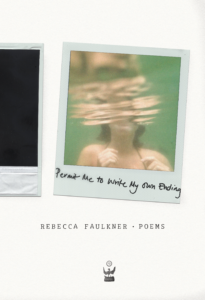 Review by Nicelle Davis
Review by Nicelle Davis
Permit Me to Write My Ending by Rebecca Faulkner begins with a scene of a dying boy seemingly choosing to end his life by plunging into the sea. The poem raises questions about whether suicide is a deliberate choice or a result of circumstances. The closing lines echo the Icarus myth, suggesting the consequences of trying to escape fate will only bring us back to the inedibility of death. The boy’s Converse shoes symbolize makeshift wings as he leaps or falls. The ending lines of this Proem do a good job of preparing for the haunting impression this collection imparts to the reader,
. … The papers said
we climbed too far, that accidents happen.
But I was up there with you, like before.
I know you removed your shoes,
that your blond hair flew like a slap.
This striking introduction sets the stage for a narrative exploring life’s “ordinary” violence. Despite the collection’s title implying autonomy in shaping one’s destiny, the poems prompt readers to reconsider what in life is truly a matter of choice. Fate intervenes in various aspects, leaving the speaker to grapple with how she processes these events.
The collection’s title, Permit Me to Write My Ending, implies autonomy in shaping one’s destiny. However, the poems delve into the nuances of choice and fate, presenting situations where external forces intervene, challenging the speaker’s understanding of what is genuinely within her control. This magical tension comes across with the juxtaposition of violent and tender imagery in the poems. The contrast is evident in the poem “Operation Virginity,” where the white space and white noise emphasize the comparison of sexual violence to a battlefield. The subsequent verse, “Bees,” is filled with profound tenderness and enhances the beauty of the preceding violent imagery.
In the poem “Bees” (perhaps my favorite in the collection), the imagery of a skinned knee, a colony of bees, and the act of running together with a sense of fear and love paints a vivid picture of the complexities of relationships. Two young people run to escape a litany of bee stings. I admit the lines “I could hear the sound of them / doing their best to survive, and of you, trying to love me,” carried me emotionally through the darker moments in Faulkner’s collection. Even in the worst of times, this collection provides the relief found in love (even if that love comes from unconventional places, times, and people.)
The poems about childbirth and motherhood are prime examples of violence offset by tenderness. In the collection’s middle section, many poems illustrate childbirth as traumatic as war by portraying intense physical and emotional struggles. The stark language conveys the pain and fear experienced in the delivery room, using vivid imagery to depict the challenging and overwhelming nature of the process.
The collection final section is infused with the Stones’ anthem, “You can’t always get what you want,” resonating as the poems shift perspectives from accepting “what is” to contemplating what “could be.” In this shift, the collection suggests that amidst the complexities of fate, there might be an element of choice. The transformative power of the music serves as a fitting backdrop to the exploration of human agency and the possibility of shaping one’s destiny. By weaving the song into the thematic fabric of the collection, the poems invite readers to reconsider the blurred boundaries between what is predetermined and what can be actively chosen, fostering a nuanced understanding of the intricate dance between fate and personal agency.
Nicelle Davis is poet, collaborator, teacher, and performance artist residing in California who “…uses uses video, poetry, performance and publication to discuss topics ranging from artistic collaboration, feminist identity, poverty and power, and the environment.” (nicelledavis.net). She is the author of four previous books of poetry, and her poetry/film collaborations with Cheryl Gross have been shown around the world.
